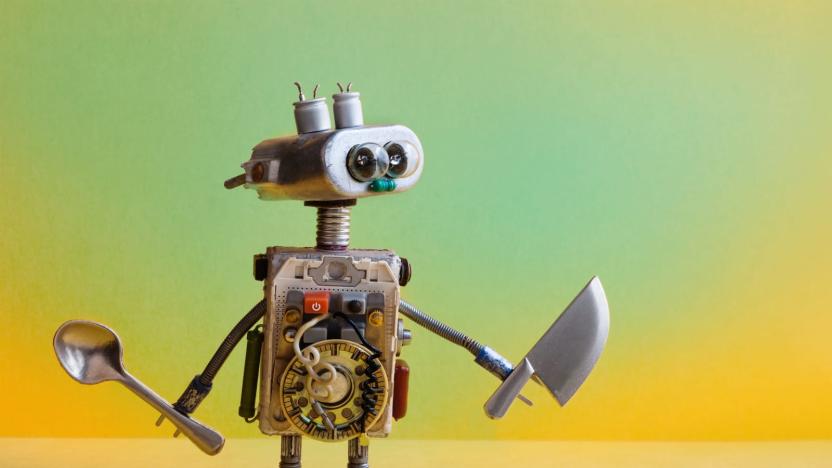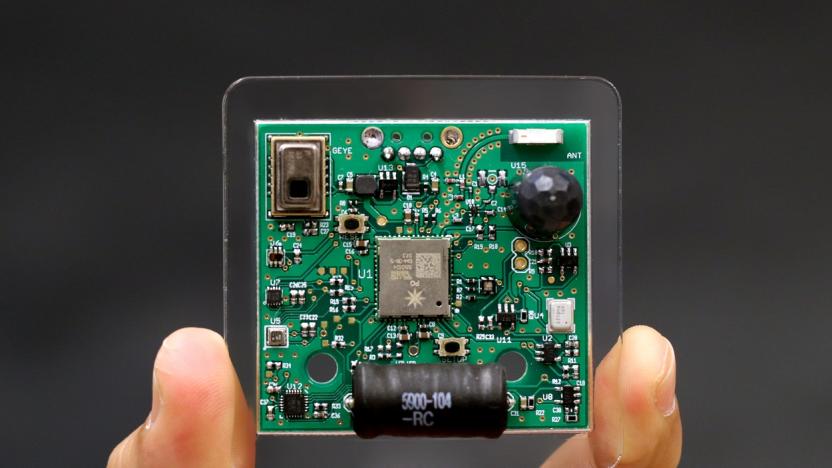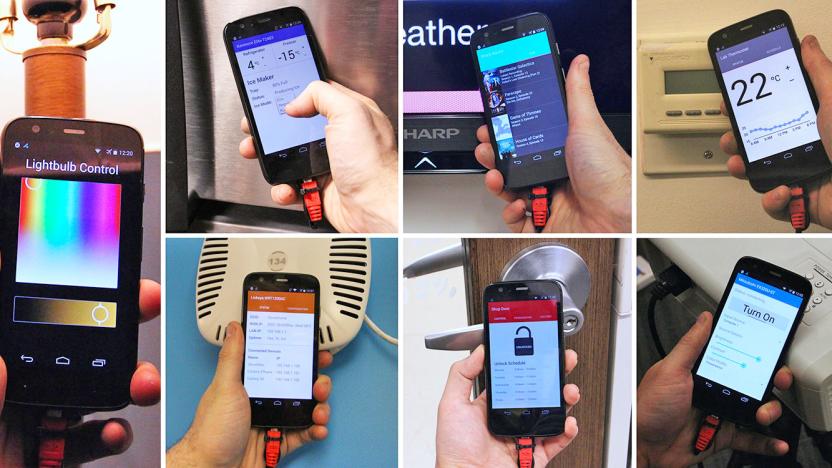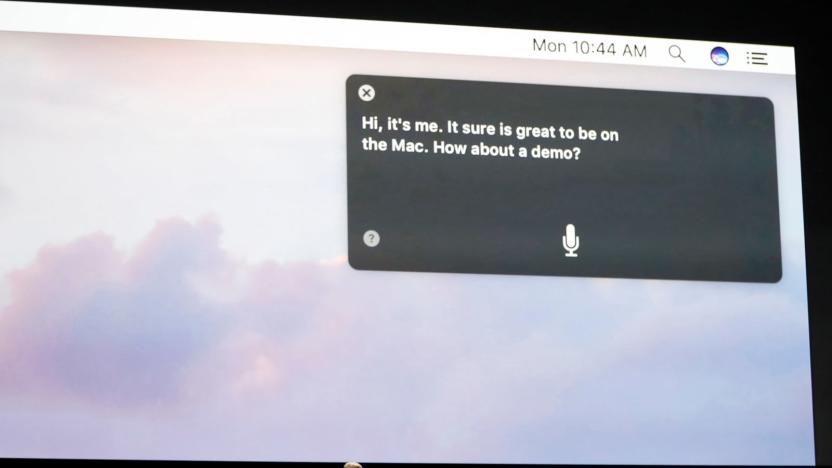carnegiemellon
Latest

Facebook and CMU's poker AI beat five pros at once
Facebook and Carnegie Mellon University have built another artificial intelligence bot that beat some top poker pros. While AI bots have been to best professional players in one-on-one competition, Facebook claims it's the first time a bot has been able to beat top pros in "any major benchmark game" when there's more than one opponent at a time. Pluribus bested professionals in no-limit Texas Hold'em in a couple of different formats: five AI bots and one human, and one bot and five real-life players. The researchers behind Pluribus wrote in a paper published in Science that creating such a multiplayer poker bot "is a recognized AI milestone."

Speculative gadgets at the Future Interfaces Group
To try to get a glimpse of the everyday devices we could be using a decade from now, there are worse places to look than inside the Future Interfaces Group (FIG) lab at Carnegie Mellon University. During a recent visit to Pittsburgh by Engadget, PhD student Gierad Laput put on a smartwatch and touched a Macbook Pro, then an electric drill, then a door knob. The moment his skin pressed against each, the name of the object popped up on an adjacent computer screen. Each item had emitted a unique electromagnetic signal which flowed through Laput's body, to be picked up by the sensor on his watch.

Amazon's Alexa Fellowship expands to 14 more universities
Amazon is eager to get more bright minds working on voice technology, so it's expanding the Alexa Fellowship program to 14 more universities, including Massachusetts Institute of Technology, Texas A&M and Cambridge. The fellowships are financed through Amazon's $200 million Alexa Fund.

Carnegie Mellon offers undergrad degree in artificial intelligence
Carnegie Mellon has announced one of the first* AI-focused undergraduate degrees in the US to address the increasing demand for specialists in the field. Tech giants like Google have been ramping up their artificial intelligence efforts in recent years, since they've become integral in the development of machine learning techniques used for their products. Mountain View, for instance, recently showed off a talking AI assistant so human-like that the company had to design a feature to make sure it identifies itself as a robotic assistant before speaking. The university is perhaps the best institution to offer an undergrad degree in AI, considering it ranked first in a recent study of the top AI graduate programs in the country.

Sony and Carnegie Mellon team up to research cooking robots
Robots might not be a novelty in the kitchen for much longer if Sony and Carnegie Mellon University have their way. They've struck an agreement that will have the two collaborating on AI and robotics research, initially focusing on food prep, cooking and delivery. They'll start by augmenting manipulation robots and will eventually develop robots customized for specific food types and the limited spaces of kitchens.

This year we took small, important steps toward the Singularity
We won't have to wait until 2019 for our Blade Runner future, mostly because artificially intelligent robots already walk, roll and occasionally backflip among us. They're on our streets and in our stores. Some have wagged their way into our hearts while others have taken a more literal route. Both in civilian life and the military battlespace, AI is adopting physical form to multiply the capabilities of the humans it serves. As robots gain ubiquity, friction between these bolt buckets and we meat sacks is sure to cause issues. So how do we ensure that the increasingly intelligent machines we design share our ethical values while minimizing human-robot conflict? Sit down, Mr. Asimov.

A smart home mega sensor can track what goes on in a room
Creating a smart home currently requires either linking every connected device one-by-one or adding sensor tags to old appliances to make a cohesive IoT network, but there might be an easier way. Researchers at Carnegie Mellon developed a concept for a hub that, when plugged into an electrical outlet, tracks ambient environmental data -- essentially becoming a sensor that tracks the whole space. With this in hand, savvy programmers can use it to trigger their own connected home routines.

Future phones will ID devices by their electromagnetic fields
While NFC has become a standard feature on Android phones these days, it is only as convenient as it is available on the other end, not to mention the awkwardness of aligning the antennas as well. As such, Carnegie Mellon University's Future Interfaces Group is proposing a working concept that's practically the next evolution of NFC: electromagnetic emissions sensing. You see, as Disney Research already pointed out last year, each piece of electrical device has its own unique electromagnetic field, so this characteristic alone can be used as an ID so long as the device isn't truly powered off. With a little hardware and software magic, the team has come up with a prototype smartphone -- a modified Moto G from 2013 -- fitted with electromagnetic-sensing capability, so that it can recognize any electronic device by simply tapping on one.

Get ready to 'spray' touch controls onto any surface
Nowadays we're accustomed to the slick glass touchscreens on our phones and tablets, but what if we could extend such luxury to other parts of our devices -- or to any surface, for that matter -- in a cheap and cheerful way? Well, apparently there's a solution on the way. At the ACM CHI conference this week, Carnegie Mellon University's Future Interfaces Group showed off its latest research project, dubbed Electrick, which enables low-cost touch sensing on pretty much any object with a conductive surface -- either it's made out of a conductive material (including plastics mixed with conductive particles) or has a conductive coating (such as a carbon conductive spray paint) applied over it. Better yet, this technique works on irregular surfaces as well.

Famous poker-playing AI takes down scientists and engineers
Libratus, the poker-playing AI that crushed four world-class pros in January, has put another group of human players to shame. This time, the upgraded variant of the AI known as "Lengpudashi" or "cold poker master" took on World Series veteran Alan Du and a team of engineers, computer scientists and investors. Instead of using pure poker skills to try and defeat Lengpudashi like the first team did, the new players applied what they know about machine learning to their game. Alas, their strategy didn't work, and the AI still won by a landslide after playing 36,000 hands against the team at a resort on China's Hainan island.

How an AI took down four world-class poker pros
"That was anticlimactic," Jason Les said with a smirk, getting up from his seat. Unlike nearly everyone else in Pittsburgh's Rivers Casino, Les had just played his last few hands against an artificially intelligent opponent on a computer screen. After his fellow players -- Daniel McAulay next to him and Jimmy Chou and Dong Kim in an office upstairs -- eventually did the same, they started to commiserate. The consensus: That AI was one hell of a player.

Libratus, the poker-playing AI, destroyed its four human rivals
The Kenny Rogers classic profoundly states that "you've got to know when to hold 'em, know when to fold 'em," and for the first time, an AI has out-gambled world-class players at heads-up, no-limit Texas Hold'em. Our representatives of humanity -- Jason Les, Dong Kyu Kim, Daniel McAulay and Jimmy Chou -- kept things relatively tight at the outset but a ill-fated shift in strategy wiped out their gains and forced them to chase the AI for the remaining weeks. At the end of day 20 and after 120,000 hands, Libratus claimed victory with daily total of $206,061 in theoretical chips and an overall pile of $1,766,250.

Two research teams taught their AIs to beat pros at poker
Poker-playing bots aren't exactly new -- just ask anyone who's tried to win a little cash on PokerStars -- but two different groups of researchers are setting their sights a little higher. To no one's surprise, those AI buffs are trying to teach their algorithms how to beat world-class Texas Hold'em players, and they're juuuust about there.

US lead on AI will shrink without more funding and education
Over a month ago, the White House released a report exploring AI's promises and challenges. Today, climate change denier and Senator Ted Cruz, head of the Senate's Space, Science and Competitiveness subcommittee, held a public hearing to follow up on the subject. He and members of the Senate's greater Commerce, Science and Transportation committee petitioned four prominent experts in the field to give a status update on artificial intelligence. Their message was clear: AI has a lot of potential to boost American production, but unless we educate far more experts, US research will be overtaken by China, India and other nations that are increasingly investing in the field.

Humans have unique brain 'fingerprints,' scientists confirm
People say "our brains are wired differently," and now a team of scientists led by Carnegie Mellon researchers have proven that's literally the case. The group developed a way to "fingerprint" the human brain using diffusion MRI and found that its structural connections are so unique, they can be used to identify individuals. According to the team's paper published in PLOS, they used the diffusion MRI results of 699 subjects' brains. Diffusion MRI is called as such, because it uses the diffusion process of water molecules in biological tissues to generate contrast in images.

Apple hires a Carnegie Mellon professor to improve its AI
Apple isn't letting Samsung's acquisition of Viv go unanswered. The Cupertino crew has hired Russ Salakhutdinov, a computer science professor at Carnegie Mellon University, as a director of artificial intelligence research. Interestingly, he isn't giving up his school work -- he may well be publishing research at the same time as he's upgrading your iPhone or Mac. It's not certain what he'll be working on, although Recode observes that his recent studies have involved understanding the context behind questions. We've asked Apple if it can comment.

ICYMI: Get your makeup done in minutes
try{document.getElementById("aol-cms-player-1").style.display="none";}catch(e){}Today on In Case You Missed It: Panasonic is channeling a wonderful Jetson's future by first using a mirror to determine your skin's flaws, then printing out foundation and concealer within minutes, that can be smoothed onto the skin. It is a prototype system so far, which they just displayed at a Japanese tech show. Also at CEATEC, Honda unveiled its concept micro-commuter car that is 3D printed and can be customized depending on the owners' needs, like requiring a hatchback or lower doors than standard models.

Simple robot roams around using just a ball motor
Robots don't have to be overly complex to perform more than basic tasks. Carnegie Mellon University researchers have created SIMbot, a human-sized cylindrical robot that gets around with only one moving part besides the robot itself: the ball at its base. It's a spherical induction motor that uses a combination of magnetic fields and clever math to move in any direction, including turning around in a complete circle. That not only allows for a much simpler (and thus more reliable) robot, but also permits very tall robots that won't easily tip over. You can even push SIMbot and watch it roll back into place.

ICYMI: Goat-inspired robot design and apple picking
try{document.getElementById("aol-cms-player-1").style.display="none";}catch(e){}Today on In Case You Missed It: A researcher at Carnegie Mellon created the GOAT leg for robots that moves much like a pogo-stick and posted a video of its tests to YouTube. Meanwhile a robot to harvest apples might still be in prototype, but it's miles more advanced than the thing that just shakes trees violently until all the apples fall off. The mechanized sushi chef video can be found here, the boy who swallowed a dog toy here, and Joe Biden not being able to let go is here. As always, please share any interesting tech or science videos you find by using the #ICYMI hashtag on Twitter for @mskerryd.

EPA hands out $4.5 million to build better air pollution sensors
The Environmental Protection Agency doesn't just want to clamp down on pollution... it wants to develop the technology that helps spot that pollution. It's handing out a total of $4.5 million in grants to six research teams (including Carnegie Mellon, MIT and the University of Washington) to help develop lower-cost, easier-to-use air pollution sensors. EPA officials hope that this will help neighborhoods track their own air quality and improve health on a local level. You'd have a better idea of whether or not industry really is contributing to the smog in your neighborhood, for instance. Although it'll likely take a long while before you see results come out these grants, they could easily pay off if they lead to cleaner air in your neck of the woods.








